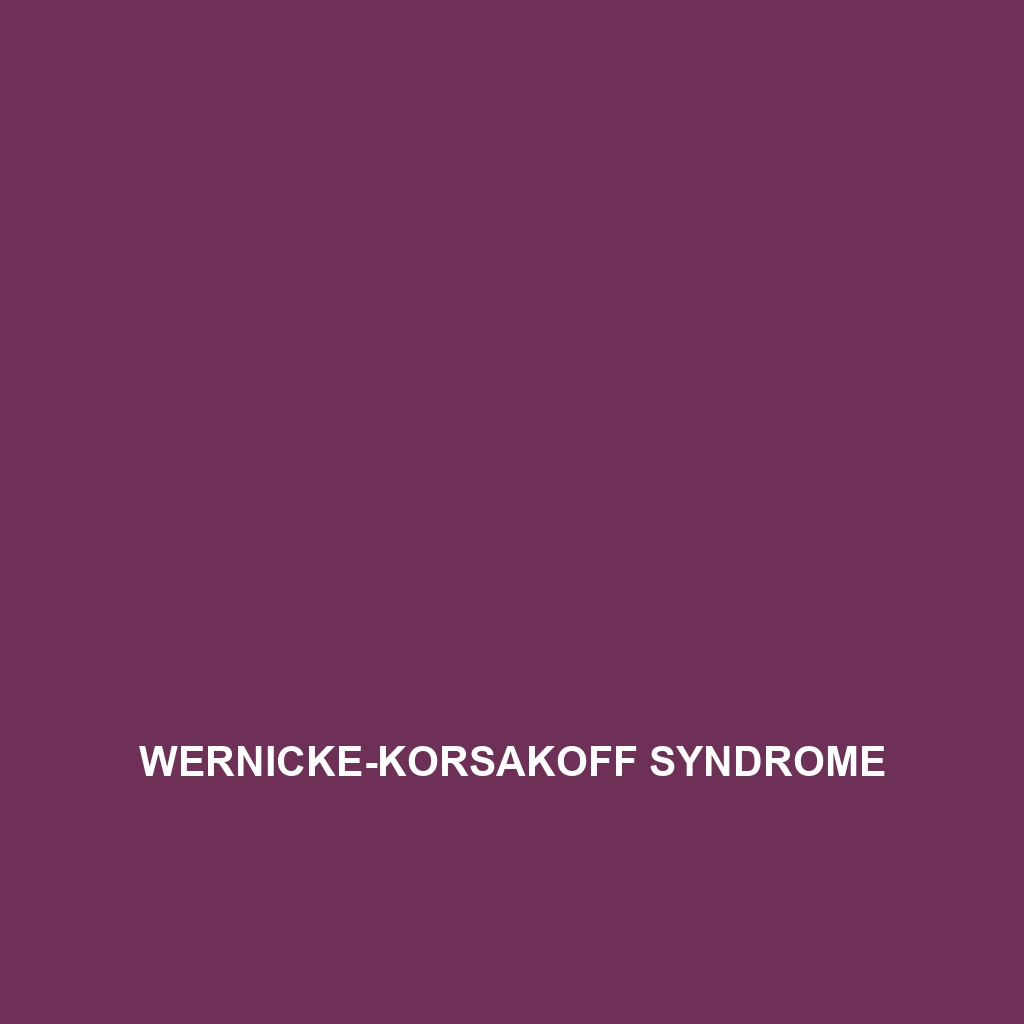Wernicke-Korsakoff Syndrome:
Definition and Description of Wernicke-Korsakoff Syndrome:
Wernicke-Korsakoff Syndrome (WKS) is a chronic neurological disorder primarily associated with severe thiamine (vitamin B1) deficiency. It is typically divided into two phases: Wernicke’s encephalopathy and Korsakoff syndrome. Wernicke’s encephalopathy presents with acute neurological symptoms such as confusion, ataxia, and ophthalmoplegia, while Korsakoff syndrome is characterized by long-term memory deficits, confabulation, and a general lack of insight. This syndrome often occurs in individuals with chronic alcoholism, but it can also be seen in individuals with other conditions that lead to nutritional deficiencies.
Causes of Wernicke-Korsakoff Syndrome:
The leading cause of Wernicke-Korsakoff Syndrome is chronic alcoholism, which significantly impairs the body’s ability to absorb thiamine. Other potential causes include malnutrition, prolonged vomiting, eating disorders, gastrointestinal diseases, and conditions that affect nutrient absorption. Genetic predispositions may also play a role, although the primary focus remains on lifestyle and dietary factors.
Associated Symptoms of Wernicke-Korsakoff Syndrome:
Common symptoms of Wernicke-Korsakoff Syndrome include:
- Confusion and disorientation
- Memory loss, particularly short-term memory
- Confabulation—filling in gaps in memory with fabricated stories
- Ataxia—loss of coordination and balance
- Ophthalmoplegia—loss of eye movement control
- Neurological deficits and peripheral neuropathy
Diagnosis of Wernicke-Korsakoff Syndrome:
Healthcare professionals typically diagnose Wernicke-Korsakoff Syndrome through a combination of clinical evaluation and patient history, focusing on nutritional intake and symptoms. Imaging studies, such as MRI or CT scans, may be used to rule out other conditions. Laboratory tests can measure thiamine levels to confirm deficiency.
Risk Factors for Wernicke-Korsakoff Syndrome:
Individuals at higher risk for developing Wernicke-Korsakoff Syndrome include:
- Chronic alcohol users
- Individuals with a poor diet or malnutrition
- Those with gastrointestinal diseases affecting nutrient absorption
- Patients undergoing prolonged intravenous feeding
- People with eating disorders
Complications of Wernicke-Korsakoff Syndrome:
If left untreated, Wernicke-Korsakoff Syndrome can lead to significant complications, including permanent cognitive impairments, psychiatric disorders, loss of motor function, and increased vulnerability to neurological disorders. Individuals may experience a decline in overall quality of life and inability to perform daily activities.
Treatment Options for Wernicke-Korsakoff Syndrome:
The primary treatment for Wernicke-Korsakoff Syndrome involves immediate thiamine supplementation, typically administered intravenously in acute cases. Long-term management includes nutritional support, counseling for alcohol use disorder, rehabilitation therapies, and social services to assist with daily functioning.
When to See a Doctor for Wernicke-Korsakoff Syndrome:
It is crucial to seek medical attention if symptoms such as severe confusion, memory loss, loss of coordination, or issues with eye movement are observed—especially in individuals with a history of alcoholism or poor nutrition.
Prevention of Wernicke-Korsakoff Syndrome:
Prevention strategies include maintaining adequate nutritional intake, especially thiamine-rich foods such as whole grains, legumes, and nuts. Individuals with chronic alcohol use should seek treatment to address their addiction and consider vitamin supplementation as part of their recovery plan.
Statistics and Prevalence of Wernicke-Korsakoff Syndrome:
Wernicke-Korsakoff Syndrome is estimated to occur in approximately 1.5% to 2.5% of individuals with chronic alcoholism. The prevalence may be higher in individuals with other risk factors, such as malnutrition or certain gastrointestinal conditions.
Personal Stories or Case Studies about Wernicke-Korsakoff Syndrome:
Sharing personal accounts of individuals who have experienced Wernicke-Korsakoff Syndrome can offer valuable insights into the emotional and psychological effects of the condition. For example, many have described how they struggled with memory loss and the challenges of rehabilitation, highlighting the importance of support and understanding from family and friends during recovery.
Myths and Misconceptions about Wernicke-Korsakoff Syndrome:
Common misconceptions include the belief that Wernicke-Korsakoff Syndrome only occurs in alcoholics and that it is purely a mental health disorder. In reality, while it is often associated with alcoholism, it can arise from various causes and involves a complex interplay of neurological and nutritional factors.
Support and Resources for Wernicke-Korsakoff Syndrome:
For those dealing with Wernicke-Korsakoff Syndrome, various support groups and resources are available. For more information, visit this support page for additional resources and help.
Conclusion about Wernicke-Korsakoff Syndrome:
Wernicke-Korsakoff Syndrome is a serious but manageable condition that requires prompt treatment and ongoing support. Understanding the causes, symptoms, and treatment options can empower individuals and their families to take proactive measures towards recovery and prevention. Early intervention is crucial to minimizing long-term effects and improving the quality of life for those affected.
